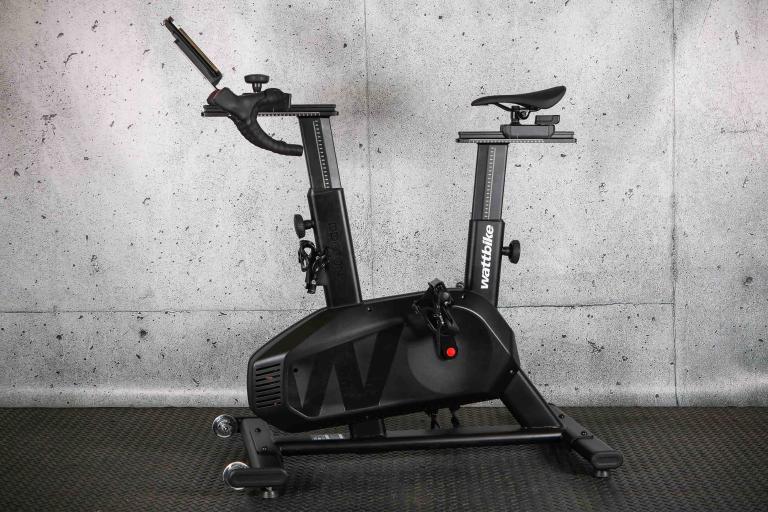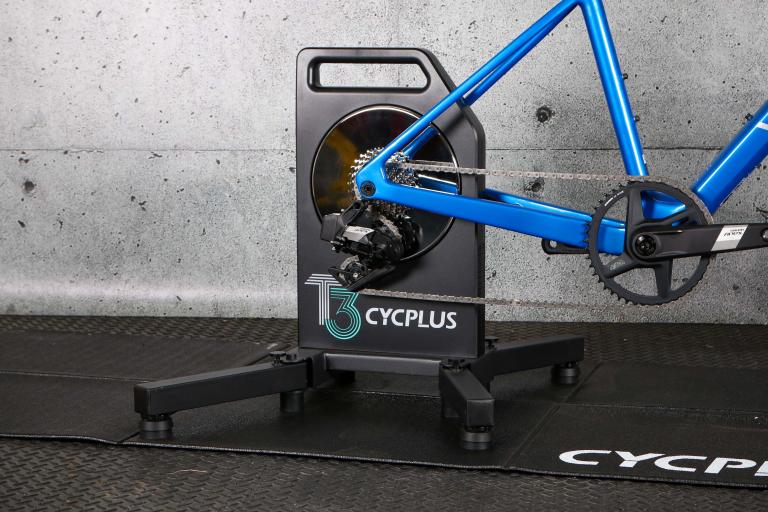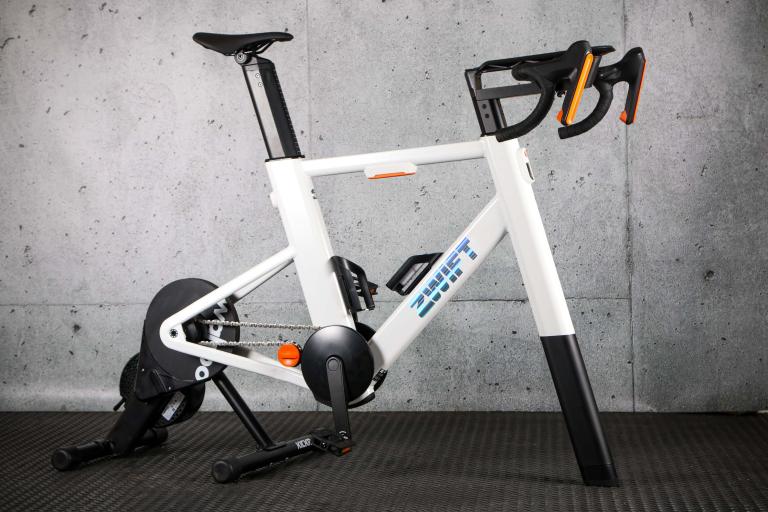- News
- Reviews
- Bikes
- Components
- Bar tape & grips
- Bottom brackets
- Brake & gear cables
- Brake & STI levers
- Brake pads & spares
- Brakes
- Cassettes & freewheels
- Chains
- Chainsets & chainrings
- Derailleurs - front
- Derailleurs - rear
- Forks
- Gear levers & shifters
- Groupsets
- Handlebars & extensions
- Headsets
- Hubs
- Inner tubes
- Pedals
- Quick releases & skewers
- Saddles
- Seatposts
- Stems
- Wheels
- Tyres
- Tubeless valves
- Accessories
- Accessories - misc
- Computer mounts
- Bags
- Bar ends
- Bike bags & cases
- Bottle cages
- Bottles
- Cameras
- Car racks
- Child seats
- Computers
- Glasses
- GPS units
- Helmets
- Lights - front
- Lights - rear
- Lights - sets
- Locks
- Mirrors
- Mudguards
- Racks
- Pumps & CO2 inflators
- Puncture kits
- Reflectives
- Smart watches
- Stands and racks
- Trailers
- Clothing
- Health, fitness and nutrition
- Tools and workshop
- Miscellaneous
- Buyers Guides
- Features
- Forum
- Recommends
- Podcast
review
£449.99
VERDICT:
Big on ride quality, big on repeatable efforts, big on price… and just plain big
Weight:
19,000g
Contact:
www.chocolatedistribution.com
At road.cc every product is thoroughly tested for as long as it takes to get a proper insight into how well it works. Our reviewers are experienced cyclists that we trust to be objective. While we strive to ensure that opinions expressed are backed up by facts, reviews are by their nature an informed opinion, not a definitive verdict. We don't intentionally try to break anything (except locks) but we do try to look for weak points in any design. The overall score is not just an average of the other scores: it reflects both a product's function and value – with value determined by how a product compares with items of similar spec, quality, and price.
What the road.cc scores meanGood scores are more common than bad, because fortunately good products are more common than bad.
- Exceptional
- Excellent
- Very Good
- Good
- Quite good
- Average
- Not so good
- Poor
- Bad
- Appalling
There's a turbo trainer for every pocket and every style of rider out there. If you've got deep pockets and some money to throw at an indoor trainer and you're more of a quality or experience than quantity of stats kind of a person then you could do a lot worse than American outfit Kurt Kinetic's top end unit the Rock & Roll. There's no bells and whistles but the ride experience is right up there among the best, and if you're planning some long sessions it's certainly built to last. The ability to move the bike around adds an extra dimension to the training, too.
Your first workout will be getting the thing in the house and up together. All turbos are not made the same: at 19kg the Kurt is a true behemoth and at 121cm wide has a footprint twice the size of a normal triangular-framed unit, so if it's replacing an old machine in a confined space you do need to check it'll fit. Putting the steel frame together is easy, as is attaching the resistance unit. The QR clamp is wide enough to take a standard Shimano unit although you may want to swap for an old one to avoid scratches.
The most obvious difference with the Rock 'n' Roll, other than its size, is the elastomer sandwich that allows the bike to move from side to side when you're training. The instructions show you the process of tightening the bolts to the correct load although by following them to the letter I ended up with a rear wheel touching the carpet; luckily i noticed before I wore a big hole in it. The position of the bike, and the amount of movement, can be adjusted by tightening or loosening the bolts.
There's a big difference in the resistance unit too, though that's not so obvious. Kurt make great play of the fact that other fluid filled turbos are prone to failure at the point where the shaft enters the fluid bath. They're mostly well sealed, of course, but it's a weak point and Kurt claim their punishing in-house tests with their cadence robot, Crank Armstrong, can break a competitor's resistance unit within hours. Theirs, on the other hand, has logged over 40,000 miles without a problem. So, what's the secret? Well, the Kurt resistance unit is in two parts – a flywheel and a fluid chamber – that are magnetically coupled, so the fluid section is independent of the flywheel. The magnets are strong enough to cope with more torque than even the robot can supply, so you won't uncouple them on the sprints, and there are no seals to wear and fail. It's a simple and very elegant solution.
The Rock 'n' Roll uses a silicone fluid that keeps the same viscosity regardless of temperature, not that that's a problem as the cooling fins do a good job of keeping the Kurt fairly cool; it's warm after an hour but not hot. The designers spent a long time working on the power curve of the trainer and called upon the help of bike analytics über-brain Tom Compton of www.analyticcycling.com to come up with a curve that simulated an 'average' rider. Kurt's website is full of equations and fairly intense tables that show you what power is being generated at what speed, and you can get computers that work with the trainer to calculate your power output while giving you a host of other functions to use both on and off the turbo. There's a wired unit with all the usual computer functions (including cadence) and a wireless one that adds an HRM and an altimeter, so if you're after numbers you can have them as an optional extra. They'll stay on the bike though: neither computer can download the training info to your PC.
I'm happy with this up to a point but by adjusting the contact force and tyre pressure on my bike I was able to repeatably influence the roll down time from 20mph by over a second: clearly the speed of the roller isn't the only factor affecting resistance in this system. This didn't surprise me, and it rather makes a nonsense of Kurt quoting power down to the thousandth of a watt for a certain speed. I've taken their chart and rounded the numbers up or down to the nearest 5, and this makes it a whole lot easier to read without really affecting the accuracy: it's not like you can pedal at exactly 20mph for any length of time. I'd have to say the the numbers they do quote look to be pretty believable: while I can fairly comfortably manage a 2x20' session at 20mph (260W) it's a real struggle at 21mph (290W): about what I'd expect given my current level of fitness. The resistance is repeatable too, giving you a basis for RAMP tests and other nightmarish fitness markers through the season. The turbo comes bundled with a 'Threshold Test and Suffer Fest' DVD that you can use for this though I found it a bit, well, American.
The Rock 'n' Roll is very quiet in use, and the ride feel from the 6lb flywheel is really excellent. The power curve flattens out to very low resistance at low speeds and ramps up very quickly over 20mph, so it's great for interval training as well as being buttery smooth for long steady sessions. Climbing isn't so good as the resistance isn't high enough at low cadence – even in a big gear – to get you working really hard. The side to side movement is disconcerting at first before you realise it's actually very natural: when you're tired at the end of a session you start flinging the bike about like you would on the road. It works best with the turntable riser that Kurt supply as an optional extra, as this allows the front wheel to move and increases the feeling of freedom. Because the bike is suspended on elastomers it's much more comfortable than a rigid framed turbo too. I felt much less saddle sore after an hour on the Kurt than I normally do.
Verdict
Overall the build quality and ride feel of the Kurt are what mark it out. If you're sure this is the trainer for you you're unlikely to need to ever buy a second one, especially since there's an unconditional lifetime warranty. It doesn't do anything massively clever but if you're committed to doing the hours and you're not after a more interactive experience from one of the VR trainers then it's certainly one for the shopping list. Solid, repeatable training is the key to winter fitness and the Kurt offers that in abundance.
road.cc test report
Make and model: Kurt Kinetic Rock & Roll Road turbo trainer
Size tested: n/a
Tell us what the product is for, and who it's aimed at. What do the manufacturers say about it? How does that compare to your own feelings about it?
They say: "Take realism and your workout to a whole new level with the only trainer that delivers natural side-to-side motion. With this unique, lateral motion, core muscles are engaged to maintain balance. So now you can simultaneously workout both technique and power— especially during out-of-the-saddle hill climb intervals. Get on. Give your expectations a workout." I'd agree, apart from I don't think it's the best for hill reps.
Tell us some more about the technical aspects of the product?
Steel framed, elastomer-suspended turbo trainer with magnetically coupled sealed fluid resistance unit
Rate the product for quality of construction:
9/10
Only marked down for the slightly plasticky RU mount, everything else is rock solid
Rate the product for performance:
9/10
Very smooth, quiet, great resistance curve
Rate the product for durability:
10/10
can't imagine it would ever break, to be honest
Rate the product for weight, if applicable:
8/10
Heavy is good in this instance...
Rate the product for comfort, if applicable:
8/10
Turbos don't major on comfort but this one's better than most
Rate the product for value:
7/10
The quality is there, it ain't cheap though
Tell us how the product performed overall when used for its designed purpose
Very well. best for steady sessions and RAMP efforts (urgh)
Tell us what you particularly liked about the product
The natural motion and resistance curve, the smooth spin down
Tell us what you particularly disliked about the product
The fact that it's a turbo trainer...
Did you enjoy using the product? Enjoy?
Would you consider buying the product? For the amount of time I spend on the turbo I wouldn't really be able to justify it
Would you recommend the product to a friend? Yes, if they were serious about getting the static miles in
About the tester
Age: 36 Height: 190cm Weight: 98kg
I usually ride: whatever I\'m testing... My best bike is: Trek 1.5 with Ultegra 6700
I've been riding for: 10-20 years I ride: Every day I would class myself as: Experienced
I regularly do the following types of riding: time trialling, commuting, sportives, general fitness riding, fixed/singlespeed, mtb, Mountain Bike Bog Snorkelling, track
Dave is a founding father of road.cc, having previously worked on Cycling Plus and What Mountain Bike magazines back in the day. He also writes about e-bikes for our sister publication ebiketips. He's won three mountain bike bog snorkelling World Championships, and races at the back of the third cats.
Latest Comments
- mdavidford 5 min 54 sec ago
Not only that - it seems to have given him a good old scrape up by his elbow as well.
- quiff 19 min 40 sec ago
I try to sit next to my (not Ti) Brompton, but have thought I should probably use a basic cable lock on the luggage rack - would be very easy to...
- mdavidford 24 min 11 sec ago
Didn't happen.
- Gbjbanjs 31 min 8 sec ago
I thought MvDP win yesterday was brilliant. Not to detract from the moron who threw this bottle but MvDPs reaction at the time was so on brand for...
- Smoggysteve 1 hour 23 sec ago
If a thief is determined enough they will get what want. But even a chain would, in many cases, reduce the element of the opportunist thief....
- Bob Sprocket 1 hour 39 min ago
F. UCI , F. Warners
- quiff 2 hours 37 min ago
I assume a "twin-pack" of socks for £31 means 2 pairs? But knowing Assos prices, I can't be sure.
- Rendel Harris 3 hours 7 min ago
No, she doesn't. She goes on to say that she said to the driver "there was nothing you could have done" after Lucas swerved in front of him. She...
- Secret_squirrel 3 hours 32 min ago
It may not be see-through but given I can clearly see the bib short straps through it - its not far off....
- chrisonabike 3 hours 48 min ago
"This isn’t about resisting change this is about calling for progress that reflects real local needs"...













Add new comment
2 comments
Whats the idea behind an altimeter on a turbo trainer? Don't most people usually pick flat routes on the turbo anyway
hur hur. the computer is a fairly normal, if well-equipped, bike computer (ie designed for use off the turbo) but on the turbo it also gives power readings calibrated to the Kurt. in case you weren't just being sarcastic